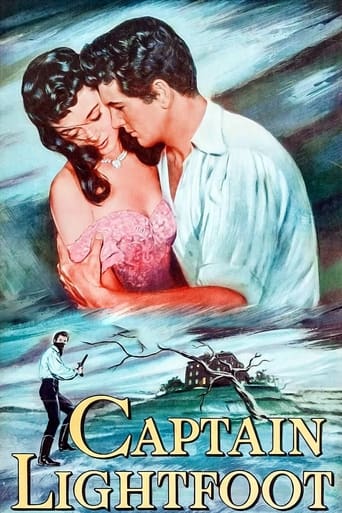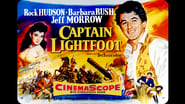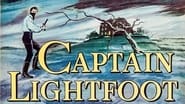weezeralfalfa
A story of largely landless Irish Catholic resistance against a pervasive Protestant landowning class, in the early 1800s. It's based on the novel of the same name, released the year before, in 1954. A relatively small amount of time is spent on actual violent events. It more focuses on events leading up to such physical clashes, and on the sporadic romance between highwayman Michael Martin(Lightfoot), played by Rock Hudson, and Aga Doherty(Barbara Rush), impish ingénue daughter of John Doherty(Thunderbolt), played by Jeff Morrow. Actually, the nicknames Lightfoot and Thunderbolt are used sparingly, preference being given to their given names. Rock and Barbara appear to be playing characters actually about a decade younger than themselves. The on again, off again, romance between Michael and Aga reaches low points when he gives her a good paddling for being contrary("You're acting like my father"), when she announces her imminent marriage to one of Michael's foes, to spite him, and near the end, when Michael says he leads too dangerous a life to be married(With Aga's prodding, he soon changes his mind). These events are interspersed with several very passionate kisses, which express their true feelings toward each other. She's especially impressed with his performance in a formal duel with his romantic rival, Captain Hood. There was only one acceptable outcome of this duel, which was for both to miss. After Hood missed, Michael shot into a nearby scarecrow. If he were to kill or even wound Hood, even in a formal duel, he would be in big trouble with the law. The initial section deals with several robberies by Michael, sometimes aided by his friend Tim, in the Ballimore area. The local resistance cell refused to take stolen money for fear it would make them more harassed by the authorities. He was advised to relocate in the Dublin area, which he did, with some difficulty from the English dragoons. He was fortuitously picked up by Doherty, disguised as a parson, who took him to Dublin. Despite the general description of Michael and Doherty as highwaymen, I didn't see Doherty participate in any robbery, and there were no further robberies by Michael. Perhaps the older Doherty was once a highwayman, but in recent times he 'robbed' the rich by encouraging them to gamble at his casino. He also had a bevy of prostitutes for hire.(Michael seemed never to have heard of such!). Irish accents of the various players varied greatly. Rock's rather minimal display tended to wax and wane, especially toward the last part. Barbara made virtually no attempt at an accent. Both Michael and Doherty spent a bit of time in a castle dungeon. Michael was captured trying to free Doherty. Unfortunately, others had just recently freed Doherty, and Michael was captured. The several hair-raising escapes from prison or from pursuing dragoons, by the 2 men, are among the action highlights.Production values are high, and cinematography excellent, with most of the action taking place in several locations in Ireland. Fans of Hudson and Barbara should not pass this up. Some of you probably would have preferred more action scenes, which is the chief gripe I have. Available at YouTube.
JohnHowardReid
This film is singularly lacking in power and excitement, despite actual lensing in Ireland in CinemaScope and color. Despite lavish production values, the story is weak, the dialogue weaker and the acting tepid. Sirk's perfunctory direction does not help. It's one of those films in which the music score attempts to do all the work of building up suspense, excitement and atmosphere — an attempt which is by no means a successful one.Every bit as boring as I remembered it on its first release, "Lightfoot" is not only thoroughly routine and thoroughly dull, but totally without interest in acting, writing, direction or production. It's dull enough with Jeff Morrow partnering Rock in "hairbreadth" escapades, but with the entry of Barbara Rush as Rock's romantic interest it gets even duller, even more predictable and even less interesting. You need a big supply of stay-awake pills to sit this one through.
dbdumonteil
This is not really a drama;this is not a story of sound and fury either. Sirk's swashbuckler is a bit tongue-in -cheek .He often makes a fool of his hero (Rock Hudson ,his favourite actor ,he will be featured in many other Sirk works including the stunning "magnificent obsession" and "written on the wind" ): he tries to help captain Thunderbolt to escape and ends up himself in prison;on the roof he unintentionally rings the bell.Barbara Rush (another Sirk's favourite:she will team up with Hudson again in " Taza" and "obsession")gets a good whacking.The political side remains vague and neither the Irish nor the English seem to take it seriously although it's not really a comedy.But the main interest is the splendid cinematography ,the marvelous landscapes :the scene when Lightfoot and Regis try to escape and end up in the river is masterfully filmed.There's something nonchalant ,which makes "captain Lightfoot" a distant cousin of "a scandal in Paris" (1946) in Sirk's filmography.That said,it's entertaining but I do not think that it ranks with the director's best films.
graham clarke
Universal in the early Fifties was a decidedly second rate studio in desperate need of a star of their own. Director Douglas Sirk spotted Rock Hudson in a bit role and sensed star potential. Sirk almost single handedly coached and groomed Hudson towards stardom, which was achieved with the wildly successful "Magnificent Obsession" (1954). They would make eight movies together, "Captain Lightfoot" being the fourth, and the first in which Hudson would appear as an established star.Hudson's newfound stardom is palpable throughout the movie. He exudes a boyish confidence as yet unseen in his work making this the joyful romp that Sirk intended. He is matched by a feisty Barbara Rush who played opposite him in the inferior "Taza, Son of Cochise" and supported by an cast of Irish players vastly superior to the bit players Universal would have supplied had the movie not been shot in Ireland.Sirk's Hollywood career can be divided into three phases. First, the early years in a new country, finding his feet with some solid, if unexciting movies. The middle period was characterized by light weight comedies and trying his hand at different genres such as the western, the costume and historical dramas. Finally, would be his golden period of the melodramas for which he became famous. "Captain Lightfoot" signals the end of the middle period.While extremely enjoyable, it lacks sufficient substance to make it memorable. Sirk fans would naturally not want to miss this, but Rock Hudson fans in particular should seek this out. He seldom seemed to be truly having such a good time as here when flexing his new grown wings of stardom.





